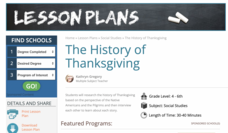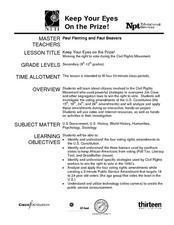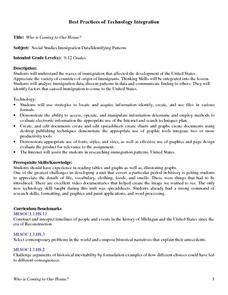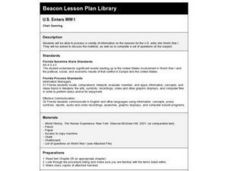Library of Virginia
Antebellum Freedom
From indentured servitude to involuntary race-based servitude, slavery has taken many forms in American history. Class members examine three manumission petitions that reveal how the rights of African Americans and African American...
PBS
Lessons in Leadership, Roosevelt Style
It's easy to criticize those in power until you're sitting at their desk, faced with the same decisions. A history lesson plan prompts secondary learners to research the Roosevelt presidencies through the lens of leadership and...
Digital Public Library of America
Teaching Guide: Exploring To Kill a Mockingbird
Harper Lee's To Kill a Mockingbird, considered by many to be a seminal piece of American literature, contains many complex literary themes that carry through United States history. Use a series of discussion questions and classroom...
Teacher.org
The History of Thanksgiving
The first Thanksgiving is the focus of a lesson that boosts reading comprehension and interview skills. Half the class reads about Pilgrims while the other half reads about the Native American, Squanto. After answering questions, pupils...
Newseum
Free Press Challenges Through History: Analyzing Historical Sources
The debate over the integrity of stories in media is not new. Young journalists analyze historical sources that reveal freedom of the press controversies and draw parallels to challenges freedom of the press faces today.
Curated OER
Immigration to the United States
Students work together as a class to create a videotape examining their different family histories. They interview their families about their experiences immigrating to America. They draw illustrations of their family to be included on...
Curated OER
Keep Your Eye On the Prize
High schoolers learn about citizens who were actively involved in the civil rights movement, and the strategies they used to overcome the Jim Crow laws that were so prevalent in the 1960s. They investigate the voting amendments of the US...
Constitutional Rights Foundation
Special Order 40
The city of Los Angeles' 1979 Special Order 40 states: "LAPD officers shall not initiate police action with the objective of discovering the alien status of a person." After reading a fact sheet that details the history of Special Order...
Curated OER
N is for Natural State
For any pupils who live in the state of Arkansas, this would be a fabulous educational experience to help them get to know their state better. Through the use of activities in literature, art, mathematics, science, social studies, and...
Advocates for Human Rights
Nativism and Myths about Immigrants
Where do anti-immigrants myths come from, and how can they be refuted? Learners critically analyze media reports and how to identify reliable sources. After studying a timeline that details the history of US nativism, groups research the...
Curated OER
Native Americans in Arkansas: The Quapaw
The Quapaw Indians of Arkansas are the focus of this American history lesson. Learners discover many aspects of the Quapaw culture, such as their dwellings, social organization, food, and how the tribe was eventually driven out of...
Stanford University
Civil Rights or Human Rights?
Young citizens consider the American civil rights movement as part of the global struggle for human rights. After using a timeline activity to learn about the major events in the civil rights movement, class members study Malcolm X's...
Curated OER
Lesson 1: English-Indian Encounters
What did the English settlers think of the Native Americans inhabiting the Chesapeake region of the United States? Learners analyze a series of documents and images to determine the English perception of the local inhabitants. A great...
PBS
Women's History: Parading Through History
Want to teach your pupils about debate, effective speech techniques, propaganda, and the women's movement? The first in a sequential series of three, scholars analyze real propaganda images from the the historic women's movement, view a...
Anti-Defamation League
Impact of the U.S. Expansion on Indigenous People and Stereotypes About Native American People
The 2004 U.S. bicentennial sparks a discussion about its meaning and importance to United States history. Readings, maps, tables, and reflective writing prompt small groups to explore the westward expansion, Lewis and Clark, and how...
Curated OER
The Cold War and Development of Post-War America
Young scholars view examples of political advertisements during the years of 1952 through 1964. After viewing, they discuss how the Cold War and the threat of Communism affected the development of the United States. They compare the...
Curated OER
Famous People and Cultural Diffusion
Students use the internet to identify cultural traditions throughout the world. In groups, they examine each culture and determine the effect they had on life in the United States. They use this information to write a family history...
Curated OER
What And Where is Puerto Rico?: History of Puerto Rico
Students study the history of Puerto Rico. They define what a commonwealth is and how Puerto Rico became a commonwealth of the United States. They research websites for history of Puerto Rico and how it operates today. They complete...
Curated OER
Analyzing the economic, political, social, and cultural transformation of the United States since World War II
Eleventh graders examine political issues in the United States between 1936 and 2000. For this American history lesson, 11th graders study the economy, education, government, civil rights, and sports of this time period. Students compare...
Curated OER
Immigration in the United States
Students examine the theory of immigration and how their ancestors became part of this Nation. They determine how immigration affected the United States through research and language activities. They construct a timeline of a time in...
Curated OER
Rice Farming History
Second graders map the progress of rice farming by using a map of the United States. In this rice farming lesson plan, 2nd graders draw a line on the map from where rice farming started to the progression of its growth.
Curated OER
Who is Coming to Our House?
Students examine waves of immigration that affected the development of the United States, appreciate variety of countries of origin of immigrants, analyze immigration data, discern patterns in data and communicate finding to classmates,...
Curated OER
Memorable Maps
Students draw an assigned map from memory about the United States or any other region they are studying. For this maps lesson plan, students draw a map from their memory at the beginning of the year, and do the same assignment at the end...
Curated OER
U.S. Enters World War I
Students explore the reasons why the United States entered into World War I and how that conflict effected the United States and Europe politically, economically and socially.
Other popular searches
- United States History
- United States Military History
- United States History 1920s
- United States History 1900's
- United States History 1700's
- United States History Essays
- Ap United States History
- Media United States History
- United States Sports History
- United States History K 2
- United States Labor History
- United States History Exam

























